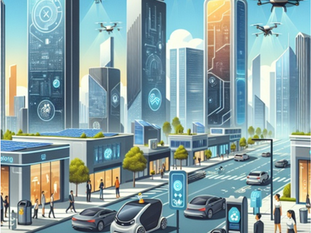
Smart City Australia: Embracing the Future with 2024 Projects #smartcityaustralia
Mar 29, 2024
2 min read
2
46
As we advance into 2024, Australia is asserting itself as a global leader in smart city development, integrating innovative technologies and sustainable practices to enhance urban living. Cities across the continent are deploying a variety of projects, harnessing data analytics, IoT, and AI to create more liveable, efficient, and inclusive urban environments. Here's a look at how Australia is shaping the future of its cities with some landmark smart city projects in 2024.

Sydney: Smart Infrastructure and Connectivity
In Sydney, a flagship initiative is the Smart Infrastructure Project, aimed at enhancing urban connectivity and resilience. By leveraging IoT sensors and advanced analytics, Sydney is optimizing traffic flow, reducing energy consumption, and improving public transportation. The city is also expanding its network of smart poles, equipped with Wi-Fi, charging ports, and environmental sensors, facilitating seamless digital access and real-time data collection.
Melbourne: Green Energy and Sustainable Living
Melbourne continues its journey toward sustainability with the Green Urban Spaces program, an endeavor that blends urban development with environmental stewardship. Utilizing green roofs, walls, and other sustainable infrastructure, Melbourne aims to decrease its carbon footprint and combat urban heat island effect. Additionally, the city is investing in renewable energy projects and smart grid technology to promote energy efficiency and reduce greenhouse gas emissions.
Brisbane: Smart Healthcare Innovation
Brisbane is pioneering in smart healthcare with the introduction of its Integrated Health Network. This project employs telemedicine, wearable devices, and AI to improve healthcare delivery and patient outcomes. By connecting healthcare providers, patients, and research institutions, Brisbane is fostering a collaborative ecosystem that advances medical innovation and provides accessible, personalized healthcare services.
Adelaide: AI-Driven Waste Management
Adelaide's commitment to sustainability is underscored by its AI-Driven Waste Management System, a project designed to optimize waste collection and recycling processes. Using AI algorithms and sensor-equipped bins, the city is enhancing the efficiency of waste management services, reducing landfill volumes, and encouraging recycling and composting among residents.
Perth: Digital Inclusion and Smart Education
Perth is focusing on digital inclusion with its Smart Education Network, aiming to bridge the digital divide and foster lifelong learning. The network provides digital literacy programs, online resources, and interactive learning platforms, ensuring that all citizens have the skills and opportunities to thrive in a digitally connected world. Moreover, Perth's schools are integrating smart technologies to create interactive, personalized learning environments that engage and inspire students.
Conclusion
As Australia forges ahead with these smart city initiatives, it is setting a global standard for urban innovation. The projects in Sydney, Melbourne, Brisbane, Adelaide, and Perth exemplify a nationwide commitment to leveraging technology for sustainable development, enhanced public services, and improved quality of life. As we witness these transformations unfold in 2024, it is clear that Australia's cities are not just adapting to the future; they are actively shaping it, creating a blueprint for smart urban living that resonates worldwide.





